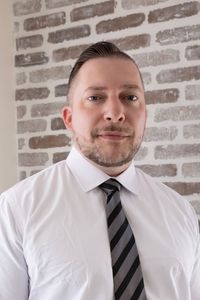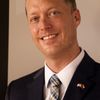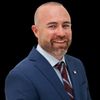Your monthly support provides voters the knowledge they need to make confident decisions at the polls. Donate today.
Justin Poff
Justin Poff (Democratic Party) is running for election to the U.S. House to represent Arizona's 5th Congressional District. He declared candidacy for the Democratic primary scheduled on August 4, 2026.[source]
Poff completed Ballotpedia's Candidate Connection survey in 2025. Click here to read the survey answers.
Biography
Justin Poff was born in Phoenix, Arizona. He graduated from Wickenburg High School. He attended Rio Salado College. His career experience includes working as an operations manager and in technology.[1]
Elections
2026
See also: Arizona's 5th Congressional District election, 2026
General election
The primary will occur on August 4, 2026. The general election will occur on November 3, 2026. Additional general election candidates will be added here following the primary.
General election for U.S. House Arizona District 5
Richard Grayson is running in the general election for U.S. House Arizona District 5 on November 3, 2026.
Candidate | ||
 | Richard Grayson (G)  | |
 = candidate completed the Ballotpedia Candidate Connection survey. = candidate completed the Ballotpedia Candidate Connection survey. | ||||
| If you are a candidate and would like to tell readers and voters more about why they should vote for you, complete the Ballotpedia Candidate Connection Survey. | ||||
Do you want a spreadsheet of this type of data? Contact our sales team. | ||||
Democratic primary election
Democratic primary for U.S. House Arizona District 5
The following candidates are running in the Democratic primary for U.S. House Arizona District 5 on August 4, 2026.
 = candidate completed the Ballotpedia Candidate Connection survey. = candidate completed the Ballotpedia Candidate Connection survey. | ||||
| If you are a candidate and would like to tell readers and voters more about why they should vote for you, complete the Ballotpedia Candidate Connection Survey. | ||||
Do you want a spreadsheet of this type of data? Contact our sales team. | ||||
Republican primary election
Republican primary for U.S. House Arizona District 5
Thomas Feely, Travis Grantham, Daniel Keenan, Mark Lamb, and Alex Stovall are running in the Republican primary for U.S. House Arizona District 5 on August 4, 2026.
 = candidate completed the Ballotpedia Candidate Connection survey. = candidate completed the Ballotpedia Candidate Connection survey. | ||||
| If you are a candidate and would like to tell readers and voters more about why they should vote for you, complete the Ballotpedia Candidate Connection Survey. | ||||
Do you want a spreadsheet of this type of data? Contact our sales team. | ||||
Withdrawn or disqualified candidates
- Andy Biggs (R)
Endorsements
Ballotpedia is gathering information about candidate endorsements. To send us an endorsement, click here.
Campaign themes
2026
Ballotpedia survey responses
See also: Ballotpedia's Candidate Connection
Justin Poff completed Ballotpedia's Candidate Connection survey in 2025. The survey questions appear in bold and are followed by Poff's responses. Candidates are asked three required questions for this survey, but they may answer additional optional questions as well.
| Collapse all
My Progressive values were shaped by lived experience as a member of the working class. I’ve felt the pressure of rising costs, stagnant wages, and systems that overlook ordinary people. These realities drive my commitment to fairness, transparency, and practical solutions that reduce suffering and expand opportunity. Professionally, I’ve built systems that empower others—whether through training or process design. I value clarity, accountability, and outcomes over ideology. I believe legislation should be lean, measurable, and focused on improving lives.
I’m motivated by a desire to make government more responsive and rooted in lived experience. I believe in the dignity of work, the power of community, and the importance of listening—especially to those most affected by public policy- We must overturn Citizen's United through a coalition between likeminded elected officials and community organization.
- We need to prioritize legislation that halts the rising cost of living, such as rent-freezing measures, anti-price gouging reforms, and pricing transparency on corporate goods.
- We must create and pass Universal Healthcare. Profits don't belong in the conversation of one's health.
George Carlin showed me how powerful it is to speak truth to power with a sharp tongue and a curious mind. He didn’t just make people laugh—he made them think, and he never backed down from uncomfortable truths.
Bernie Sanders inspires me with his relentless energy and consistency. He’s spent decades fighting for working-class values without wavering, and that kind of devotion—especially in a system designed to wear you down—is something I deeply admire.
I look up to journalists like Mehdi Hasan, who ask the hard questions without flinching. His ability to absorb complex facts and fire them back with clarity and speed is a masterclass in accountability.
And I look up to my wife. Her kindness, her pursuit of fairness, her honesty, and her unconditional love keep me grounded. She reminds me that strength isn’t just about being loud—it’s about being steady, compassionate, and true.
I believe every person has a spark inside them. Sometimes it’s buried under struggle, doubt, or the weight of a system that wasn’t built for them. If I can help ignite that spark into a raging fire—like my heroes did for me—I’ll consider that a win.
And if I can contribute in any way to reducing corporate influence and elevating working-class power, I’ll be satisfied. That means shifting the balance—away from billionaires and lobbyists, and toward the people who actually make this country run. Not just in policy, but in culture, in courage, in voice.
But the first real historical moment that stuck with me was the Oklahoma City bombing. I was 9 at the time. I didn’t understand the full scope of it then, but I remember how obsessed the media became with the man who did it. His face was everywhere. The coverage was relentless. And even as a kid, I could feel something shift. It was the first time I realized the world could be dangerous in ways I hadn’t imagined—violent, unpredictable, and close to home.
That moment was a turning point. It was when the innocence started to crack. I think a lot of young people today are living in that same space, but on a much larger scale. They’re growing up with mass shootings as a regular headline, with lockdown drills as part of their school routine. That sense of danger isn’t a one-time realization—it’s a constant background hum.
But if we’re talking first real job—the kind that sticks with you—I’d have to go back to when I was 9 or 10. My dad used to take me to work with him during the summer. While other kids were riding bikes or watching cartoons, I was learning how to install door hardware and trim in new homes. No blueprints, just a screwdriver, a tape measure, and a dad who believed in doing things right the first time. I didn’t get paid, but I got something better: a work ethic, a sense of pride, and the kind of hands-on experience that stays with you for life.
My wife recommended A New Earth by Eckhart Tolle, and it’s been a game-changer. It helps you recognize your own ego, disarm it, and actually be present in your life. That book taught me how to step back from the noise and see myself more clearly—and I’m grateful to her for that.
I’m also a huge fan of A People’s History of the United States by Howard Zinn. I think it should be required reading for anyone with even a passing interest in this country’s history. It tells the stories we weren’t taught in school—the ones that actually matter if you care about justice, power, and how change really happens.
And then there’s the Southern Reach trilogy by Jeff VanderMeer. I’m a sci-fi nerd at heart, and those books are wild, eerie, and brilliant. The movie Annihilation was based on the first book, and it’s one of my favorites—equal parts beautiful and unsettling.
He leads a crew made up of humans, androids, aliens, and wildly different personalities, and somehow manages to earn their trust without ever losing his calm or his principles. That kind of poise, that kind of integrity—it’s something I aspire to. Plus, let’s be honest: traveling the universe while wrestling with philosophical questions and interstellar diplomacy? That’s my kind of adventure.
But I never fully accepted that. I struggle when I see unfairness play out—whether it’s on a global scale or happening across the parking lot. It hits me hard. Sometimes I dwell on it for days. Sometimes I try to brush it off and tell myself what the adults used to say. But deep down, I don’t believe the world has to be this way.
A few days later, I spoke with a friend who had just returned from Washington as part of a women’s advocacy group. Without knowing anything about the conversation with the Director, she told me her group had met with every member of Arizona’s congressional delegation. She singled out Rep. Biggs for saying, again, that he never breaks with Trump and votes in full alignment with him. Hearing the same statement from two unrelated sources—one in healthcare, one in advocacy—was a moment of clarity.
I’ve heard stories like that my whole life. But when someone I didn’t know took the time to share that with me directly, it hit different. It felt personal—like it was happening to someone in my own family. It turned my stomach.
For the past three years, I’ve worked closely with a mentor who’s held me accountable and shown me what real leadership looks like. Not the performative kind, but the kind that builds trust, empowers others, and stays steady under pressure. I’ve taken what I’ve learned from him—and from coworkers, bosses, and people I respect—and used it to grow. In just a few years, I went from working outside in the brutal Arizona summers to helping build a brand-new company from the ground up.
But the government also has a role in *development*. That means investing in public-interest research, setting ethical standards, and ensuring that AI isn’t shaped solely by private profit. We need development that’s transparent, accountable, and focused on serving people—not replacing them. If we leave AI’s future entirely in the hands of corporations, we risk building tools that deepen inequality and undermine democracy. The government should be a steward—not just a referee—ensuring that AI evolves in ways that reflect our values, protect our communities, and strengthen the public good.
I’d also introduce a bill to make Election Day a national holiday—so every working-class American can participate without fear of missing work or losing wages. Voting shouldn’t be a privilege reserved for those with flexible schedules or generous employers. It should be accessible to everyone.
Beyond that, I’d fight for public financing of campaigns, automatic voter registration, and strict disclosure laws for political spending. Gerrymandering needs to go. Voter suppression tactics need to go. Every eligible voter should be able to cast a ballot without barriers, and every vote should carry equal weight.
Note: Ballotpedia reserves the right to edit Candidate Connection survey responses. Any edits made by Ballotpedia will be clearly marked with [brackets] for the public. If the candidate disagrees with an edit, he or she may request the full removal of the survey response from Ballotpedia.org. Ballotpedia does not edit or correct typographical errors unless the candidate's campaign requests it.
Campaign finance summary

See also
2026 Elections
External links
|
Candidate U.S. House Arizona District 5 |
Personal |
Footnotes
- ↑ Information submitted to Ballotpedia through the Candidate Connection survey on October 6, 2025

















